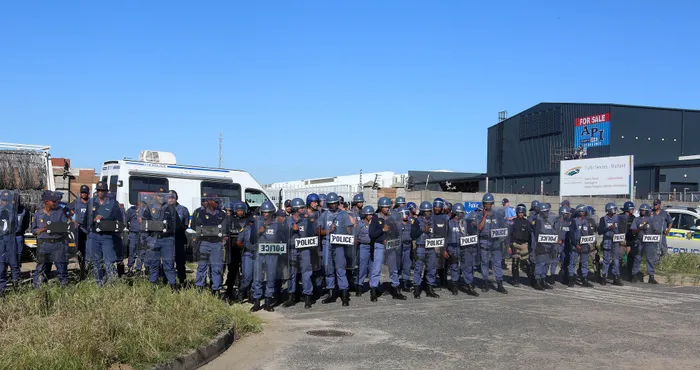
Budget cuts for policing could see fewer officers employed and, thus, an increased ability to tackle crime. Picture: IOL
As South Africa braces for the 2023 Medium Term Budget Policy Statement (MTBPS) this week, fears are high that budget cuts will have detrimental effects on service delivery, which is already poor.
It is not yet known what budget cuts will be implemented, but National Treasury recently advised national departments and provincial treasuries on specific measures required to save costs and “prevent crippling resource constraints” in the latter part of the 2023/24 financial year.
All state institutions were instructed to slash budgets by up to 15 percent, and freeze all vacancies and infrastructure rollout programmes.
Treasury says the current fiscal challenges originate “mainly from an exceptionally large year-to-date decline in government tax revenue collections” – estimated at R22 billion for the first five months of this year, and tighter financial conditions that have constrained the government’s borrowing programme.
A PwC report on South Africa’s economic outlook ahead of Wednesday’s MTBPS says expenditure has continued to grow despite Treasury asking accounting officers and authorities to save money. With this in mind, analysts surveyed by Focus Economics expect the budget deficit to grow to 5.5 percent of GDP this year (median forecast), compared to a Budget 2023 projection of 4.0 percent of GDP.
“The finance minister will need to make tough choices about how the 2023/2024 fiscal revenue gap – which we estimate at up to R30bn – and a more conservative income outlook for the rest of the medium term will be addressed.”
Generally speaking, PwC says there are three options for closing a fiscal funding gap:
1. Spend less
2. Borrow more
3. Increase taxes
With regards to spending less, the report explains that higher deficits resulting from revenue shortfalls and other expenditure overruns would most likely be funded by way of further expenditure cuts.
“The traditional method for budget cuts has been the across-the-board approach. It has also been proposed by the National Treasury that entire programmes and departments might need to be cut in order to meet budget goals. However, this will take time to implement and is not possible during 2023/2024.”
This month, Finance Minister Enoch Godongwana told Parliament that “moderate” spending cuts and a “sustainable” increase in borrowing will be implemented to narrow the income gap in 2023/2024. However, PwC says this does not remedy the problem of the government frequently receiving less income than it expects to see, and thus believes that the most likely response to the need for improving revenues over the medium term would be —as a fourth option for closing a fiscal funding gap —placing greater responsibility and pressure on SARS to improve tax compliance levels.
“The country’s tax gap (the difference between taxes legally owed and taxes collected) is currently estimated to be more than R300bn. Reducing this by 10 percent would fund the tax shortfall of R30bn that we have forecast for 2023/2024.”
Some of the national departments that could possibly be hit with budget cuts include:
As many municipalities struggle to manage their finances and deliver services to their residents, it is possible that the government could also cut funding to local governments in order to force them to improve their performance.
In addition, the government could reduce funding to other areas such as social grants, infrastructure development, and research and development.
– Public Service and Administration (PSA)
This department is responsible for managing the public service, including setting policy, developing and implementing reforms, and providing oversight. Budget cuts could lead to a reduction in staff and resources, making it more difficult for the department to carry out its mandate. This could result in a decline in the quality of public services and have the following effects:
As a result, there could be:
– Education
The department is already facing a number of challenges, including a shortage of teachers, inadequate infrastructure, and low learner performance, so budget cuts are likely to exacerbate these and make it more difficult for the department to achieve its mandate of providing quality education to all South Africans.
Budget cuts may result in:
These could further result in:
– Health
With the health department already struggling with a shortage of healthcare workers, inadequate infrastructure, and a high burden of disease, any budgets could make the prognosis even worse, leading to:
This could lead to:
– Police
The SAPS is already facing a number of challenges, including a shortage of police officers, inadequate infrastructure, and high crime rates. Budget cuts are likely to exacerbate these and make it more difficult for the department to achieve its mandate of reducing crime and keeping communities safe.
Budget cuts could have the following effects on the department:
These could therefore lead to:
IOL Business